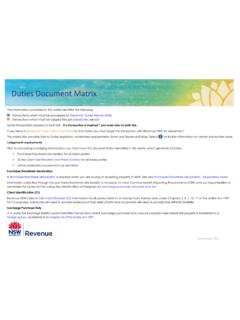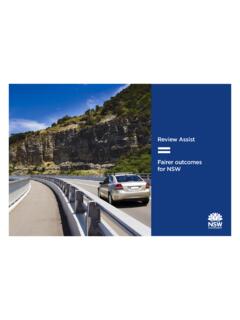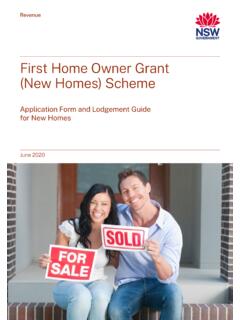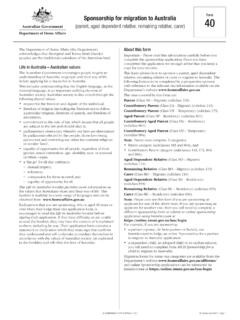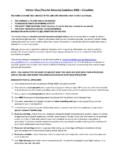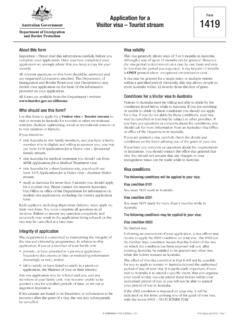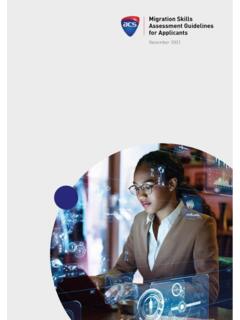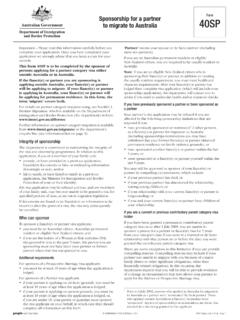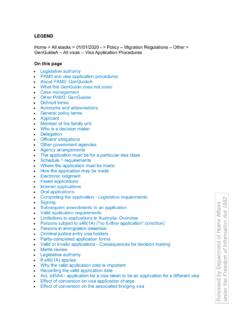Transcription of Purchaser/Transferee Declaration – Explanatory Notes and ...
1 1 of 5 RevenueODA 076 EN | Purchaser/Transferee Declaration - Explanatory Notes and Supporting Evidence | May 2022 Purchaser/Transferee Declaration Explanatory Notes and Supporting EvidencePart A Explanatory notes1. You are not a foreign person if you are:(a) an Australian citizen(b) a person who is ordinarily resident in Australia(c) a New Zealand citizen who holds a special category 32 visa and also meets 2 (a).2. Ordinarily resident in Australia means: (a) the person has actually been in Australia during 200 or more days in the period of 12 months immediately preceding the date of the agreement, and(b) was not subject to any limitation as to time for their continued presence in Australia (or was not, immediately before their most recent departure from Australia).3. visa table:Individuals who are permitted to be in Australia under a visa that is not a permanent entry visa are foreign persons , because the visas impose time limits on the person s lawful presence in Australia.
2 Such visas include a work visa , a temporary entry visa , a visitor visa , a bridging visa and a business visa . See table below for an overview of visa types and foreign surcharge requirements. For more details see: For more information on visas see: Type Additional NotesMeet 200-day ruleForeign PersonLiable to SurchargePermanent resident YesNoNoNew Zealand Citizen holding special category visa (onshore)Special category visa as defined within section 32 of the Commonwealth Migration Act 1958 YesNoNoPartner (309 & 820)Revenue Ruling G009 states that person who holds a Partner (Provisional) visa ( subclass 309 or 820) will be treated in the same way as permanent resident visa holders. The 200-day requirement will need to be (405 & 410)Holders of 405 & 410 visas are considered foreign, however the exemption provided under 104 ZKB of the Act can apply to holders of these to Explanatory Notes Part A 7 for criteriaYesNoWorkN/AYesYesTemporary entryN/AYesYesVisitorN/AYesYesBridgingN/ AYesYesBusinessN/AYesYesODA 076 EN | Purchaser/Transferee Declaration - Explanatory Notes and Supporting Evidence | May 2022 2 of 54.
3 Foreign person means:(a) an individual not ordinarily resident in Australia; or(b) a corporation in which an individual not ordinarily resident in Australia, a foreign corporation or foreign government holds a substantial interest; or(c) a corporation in which 2 or more persons each of whom is an individual not ordinarily resident in Australia, a foreign corporation or a foreign government hold an aggregate substantial interest; or(d) the trustee of a trust in which an individual not ordinarily resident in Australia, a foreign corporation or a foreign government holds a substantial interest; or(e) the trustee of a trust in which 2 or more persons each of whom is an individual not ordinarily resident in Australia, a foreign corporation or a foreign government hold an aggregate substantial interest; or(f) a foreign government; or(g) a general partner of limited partnerships where:i. an individual not ordinarily resident in Australia, a foreign corporation or a foreign government holds at least 20 per cent in the limited partnership, or ii.
4 2 or more persons of whom is an individual not ordinarily resident in Australia, a foreign corporation or a foreign government, holds an aggregate interest of 40 per cent in the limited partnership. 5. Substantial interest means:A person holds a substantial interest in an entity or trust if:(a) for an entity the person holds an interest of at least 20 per cent in the entity; or(b) for a trust (including a unit trust) the person, together with any one or more associates, holds a beneficial interest in at least 20 per cent of the income or property of the Aggregate substantial interest means:Two or more persons hold an aggregate substantial interest in an entity or trust if:(a) for an entity the persons hold an aggregate interest of at least 40 per cent in the entity; or(b) for a trust (including a unit trust) the persons, together with any one or more associates of them hold, in aggregate, beneficial interests in at least 40 per cent of the income or property of the Exempt permanent resident and retirement visa holder means:The transferee is a permanent resident or retirement visa holder when a liability for duty charged by Chapter 2 on the transfer or agreement arises (or would arise but for a concession or exemption from duty under that Chapter), and the Chief Commissioner is satisfied that the transferee intends to use and occupy the residential land to which the residential-related property relates as a principal place of residence in accordance with the residence requirement.
5 The residential land must be used and occupied by the exempt permanent resident as his or her principal place of residence for a continuous period of at least 200 days within the first 12 months after the liability date (date of agreement). This requirement is referred to as the residence Discretionary trusts:For a discretionary trust, each beneficiary that the trustee has discretion to distribute the income or property to is deemed to have the maximum percentage interest in the income or property that the trustee may exercise a discretion to distribute to them. For more details see: a discretionary trust prevents a foreign person from being a beneficiary of the trust, the trustee of the trust is not, in that capacity, a foreign trustee for the purposes of surcharge purchaser duty. For more information see CPN 004 v2: Residential land means:(a) a parcel of land on which there are one or more dwellings, a parcel of land on which there is a building under construction that, when completed, will constitute one or more dwellings, or(b) a strata lot, if lawfully occupied as a separate dwelling, or suitable for lawful occupation as a separate dwelling, or(c) a utility lot if its use is restricted to the owner or occupier of a strata lot, or(d) a land use entitlement, if it entitles the holder to occupy a building, or part of a building, as a separate dwelling, or(e) a parcel of vacant land (including any land that the Chief Commissioner is satisfied is substantially vacant) that is zoned or otherwise designated for use under an environmental planning instrument (within the meaning of the Environmental Planning and Assessment Act 1979) for residential or principally for residential Residential-related property means.
6 (a) residential land in NSW(b) an option to purchase residential land in NSW(c) an interest in any residential-related property referred to in (a) or (b), except to the extent that:i. it arises as a consequence of the ownership of a unit in a unit trust scheme and is not a land use entitlement,ODA 076 EN | Purchaser/Transferee Declaration - Explanatory Notes and Supporting Evidence | May 2022 3 of is, or is attributable to, an option over residential-related property, is a marketable security.(d)a partnership interest (being an interest in a partnership that has partnership property that is residential property). visa holder means a person who holds:(a) a visa of a subclass specified by regulations (as in force at any time) made under the Migration Act 1958 of theCommonwealth as a subclass 405 (Investor Retirement) visa or a subclass 410 (Retirement) visa , or(b) a visa under that Act of a class (or a subclass ) determined by the Chief Commissioner to be equivalent to asubclass referred to in paragraph (a).
7 Residential Revenue ruling G 011 Section 104I(2) of the Duties Act provides that a dwelling does not include a reference to a room or suite of rooms determined by the Chief Commissioner not to be a dwelling. Revenue ruling G 011 clarifies where surcharge purchaser duty will not apply to a residential premises. A request in accordance with Revenue ruling G 011 can be made by way of written submission to the Commissioner with documentation to support the requirements of the ruling (this determination is not available on EDR). When completing the Purchaser/Transferee Declaration on application under Revenue ruling G 011 you must select the non-residential land use code Commercial residential 104I(2) under part B of the form. See the ruling for more details: developers that are foreign persons Revenue Ruling G 013 Section 104 ZJA of the Duties Act provides for a surcharge purchaser duty concession for Australian-based developers that are foreign persons, subject to requirements specified therein.
8 Revenue Ruling G 013 clarifies these requirements. Applications for concession under s 104 ZJA are to be made by way of written submission to the Commissioner with documentation to support clause 9 and 10 of Revenue Ruling G 013. This transaction cannot be processed on EDR. See the ruling for more details: information about the application lodgement process can be accessed from the Plan means:(a) means an agreement for the sale or transfer of dutiable property, being land on which a residence is to beerected or developed before completion of the sale or Act 1997 - Sect 49A Purchases off the plan (1) Liability for duty on an off the plan purchase agreement arises:(a) on completion of the agreement, or(b) on the assignment of the whole or any part of the purchaser s interest under the agreement, or(c) on the expiration of 12 months after the date of the agreement,whichever first agreements dated on or after 19/05/2022, where at least one eligible purchaser was a member of the permanent forces of the Australian Defence Force and all eligible purchasers were enrolled on the NSW electoral roll as at the date of the agreement or transfer, the residence requirement does not members of the Australian Defence Force seeking exemption from the Residence Requirement must pro vide a certified copy of a document issued by the Australian Defence Force which shows that at least one of the eligible purchasers was a member of the permanent forces of the Australian Defence Force, at the date of the agreement or transferPart B Supporting evidence & record keepingNote.
9 Section 48 of the Taxation Administration Act 1996 states a person must keep such records as are necessary to enable the person s tax liability under a taxation law to be properly assessed. Section 53 of the Taxation Administration Act 1996 states a person who is required by a taxation law to keep a record must retain the record for not less than 5 years after:(a)the date it was made or obtained, or(b)the date of completion of the transaction or act to which it relates; whichever is the following table sets out the supporting evidence and record keeping requirements for different types of purchasers/transferees. ODA 076 EN | Purchaser/Transferee Declaration - Explanatory Notes and Supporting Evidence | May 2022 4 of 5 IndividualsEvidence must be provided upon requestAustralian citizens require: Certified copy of birth certificate or Australian passport or Australian Citizenship Zealand citizens require: Certified copy of New Zealand passport and evidence of holding a special category visa within the meaning of section 32 of the Migration Act person who is ordinarily resident in Australia requires: Certified copy of foreign passport with your current visa Movement records from immigration for the 12 month period preceding the date of agreementCorporationsEvidence must be provided upon request Copy of the certificate of incorporation Complete copy of the Memorandum and Articles of Association Copy of corporation register/register of shareholders as at the date of execution of dutiable in respect of each natural person shareholder.
10 Australian citizens require: Certified copy of birth certificate or Australian passport or Australian Citizenship Zealand citizens require: Certified copy of New Zealand passport and evidence of holding a special category visa within the meaning of section 32 of the Migration Act person who is ordinarily resident in Australia requires: Certified copy of foreign passport with your current visa and evidence that you meet the definition of ordinarily resident in Australia (see Explanatory Notes ).Plus for each corporate and trustee shareholder who hold a substantial interest or aggregate substantial interest in the corporation: Copy of the certificate of incorporation Complete copy of the Memorandum and Articles of Association Copy of corporation register/register of shareholders as at the date of for natural person shareholders/beneficiaries of the corporate or trustee shareholders:Australian citizens require: Certified copy of birth certificate or Australian passport or Australian Citizenship Zealand citizens require: Certified copy of New Zealand passport and evidence of holding a special category visa within the meaning of section 32 of the Migration Act person who is ordinarily resident in Australia requires: Certified copy of foreign passport with your current visa and evidence that you meet the definition of ordinarily resident in Australia (see Explanatory Notes ).



